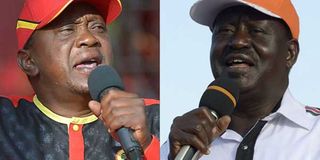Events leading to inauguration of new government

A combination of pictures of President Uhuru Kenyatta (left) addressing a crowd on August 4, 2017 during a campaign rally in Nairobi and National Super Alliance leader and presidential candidate Raila Odinga. PHOTOS | SIMON MAINA AND TONY KARUMBA | AFP
What you need to know:
For one of the eight presidential candidates to be declared an outright winner in the first round, the person would have garnered 50 per cent plus one vote in addition to at least 25 per cent of the valid votes cast in 24 counties.
If IEBC declares the final results on the seventh day from August 8, it will mean that the run-off will be held on September 14.
Chief Justice David Maraga has already published The Supreme Court (Presidential Election Petition) Rules, 2017.
Tuesday’s vote caps the high-voltage political campaigns but will usher in a chain of events leading to the inauguration of a new administration.
From the August 8 Election Day, IEBC has seven days within which to declare the final presidential results.
That translates to August 15 as the final day by which the commission should have conducted the elections, tallied and announced the results.
For one of the eight presidential candidates to be declared an outright winner in the first round, the person would have garnered 50 per cent plus one vote in addition to at least 25 per cent of the valid votes cast in 24 counties.
In case there is an outright winner in the first round election, the Assumption of the Office of President Committee, which comprises 20 senior government officials, will begin making preparations for the swearing in of the President-elect on the 14th day after IEBC declares the final results.
SWORN IN
That would see the President-elect sworn into office on August 29, going by the provision of Article 141(2a) of the Constitution.
In case there is no clear winner as provided for in the Constitution, IEBC will have to start preparing for a run-off between the top two presidential candidates in the first round elections.
Article 138 (5) of the Constitution provides that the run-off should be done within 30 days from the date IEBC declares the final results.
If IEBC declares the final results on the seventh day from August 8, it will mean that the run-off will be held on September 14.
The other possible scenario may arise in case of a dispute over the validity of the results declared by IEBC as happened in 2013.
FILE PETITION
In such a case, the aggrieved candidate or any person can file a petition in the Supreme Court to challenge the election of the President-elect within seven days after the date of the declaration of the results by IEBC.
According to the Constitution (Article 163(3a)), the Supreme Court has exclusive original jurisdiction to hear and determine presidential election petitions.
It means that any person wishing to challenge the outcome of the August 8 elections would be required to file the petition by August 22.

Chief Justice David Maraga has already published The Supreme Court (Presidential Election Petition) Rules, 2017.
According to the rules, “The petitioner shall, upon filing a petition, deposit a sum of Sh1 million as security for costs.”
Besides the applicable fee, the onus is also on the petitioner to duly serve the respondent within two days of filing the petition, either directly, by advertisement in a newspaper with national circulation or by electronic means within six hours of filing the petition.
OPINION POLLS
With most opinion polls in the past days pointing to a statistical tie between President Uhuru Kenyatta and his main challenger, Nasa’s Raila Odinga, the possibility of either of them or any other person challenging the presidential election outcome is high.
Once such a petition is filed and the respondent duly served, the Supreme Court will then have 14 days to hear and determine the petition. During the 2013 presidential election petition which was filed by Mr Odinga, the Supreme Court sat even on weekends.
By including the weekends, that means that the Supreme Court could deliver its ruling by September 5.
The Judiciary has in the past raised concern over the 14-day period for hearing and determining the presidential election petition, stating that the time is inadequate to hear and scrutinise the body of evidence. In fact, the Judiciary had unsuccessfully pushed for the period to be extended to 30 days.
JUSTICE MARAGA
Justice Maraga, who before his ascension to head the Judiciary chaired the Judiciary Committee on Elections, has bemoaned Parliament’s failure to act on their proposal to extend the period to 30 days.
“We have made more than three appeals but Parliament has turned them down. We are told our last memorandum to the Joint Select Committee on IEBC hasn’t been factored in the proposed changes. This puts the Judiciary in a quagmire,” the CJ said during the 2016 judges’ annual colloquium in Mombasa.
The Judiciary Committee on Elections is now chaired by High Court judge Msagha Mbogholi.
In case the petition is unsuccessful, Article 141(2b) provides that “The President-elect shall be sworn in on the first Tuesday following the seventh day following the date on which the court renders a decision declaring the election to be valid, if any petition has been filed under Article 140.”
That would mean the President-elect could be sworn in on September 12.
However, in case the petition is successful, IEBC will be required to conduct a fresh election within 60 days after the Supreme Court ruling.
That would mean fresh elections being held on or before November 4.





